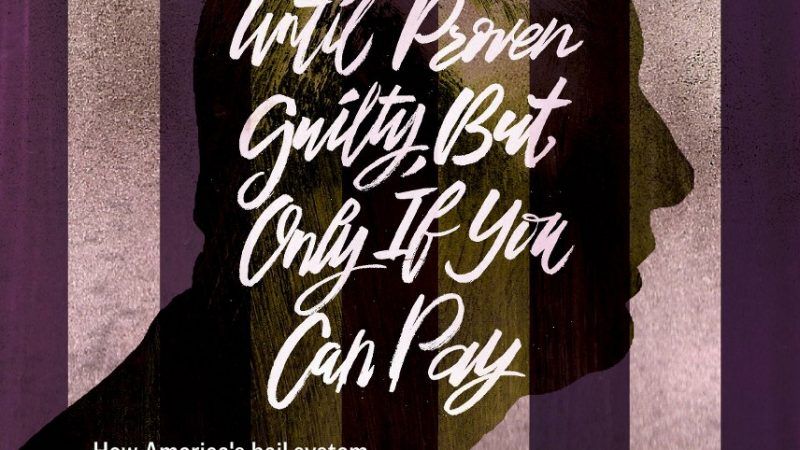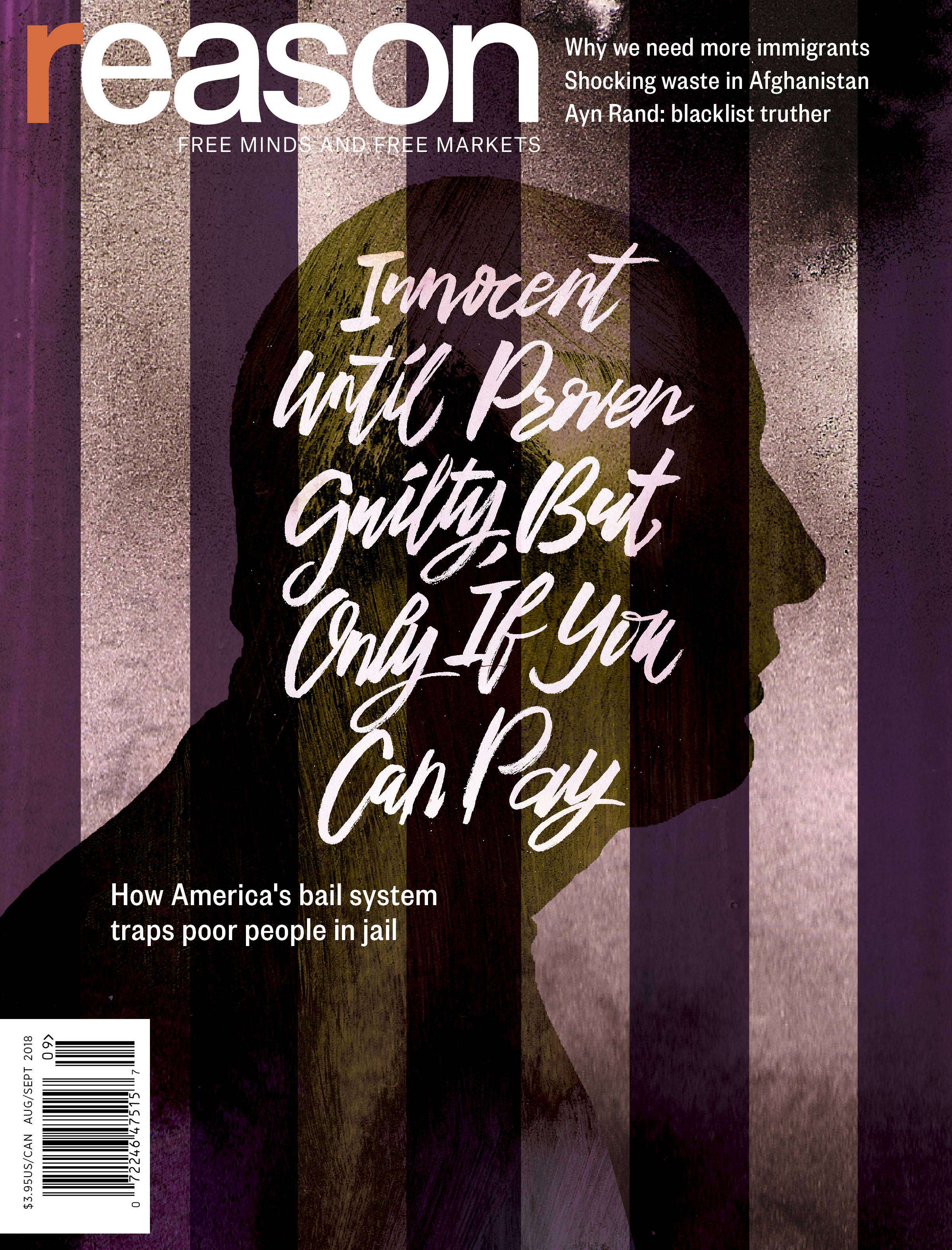Philadelphia Reduced Use of Cash Bail and the Sky Didn't Fall
Defendants aren't being ordered to pay for their freedom, and they're still coming back for court appearances.


As the push continues to reform bail systems across America, some skeptics of allowing defendants to go free without paying bail have argued that it might be harder to get these people to show up for their court dates. If they or their family members don't owe money to a bail bondsman, the argument goes, why would they show up?
That's a fair question, but the news coming out of Philadelphia, where new District Attorney Larry Krasner announced last year that he was going to significantly scale back the demand for cash bail for a huge list of offenses, is that defendants will show up.
In 2018, the city let an additional 1,750 arrestees go free pre-trial without demanding that they pay bail. This resulted in a 22 percent reduction in the number of defendants who spent at least a night in jail. This week, two professors released a report analyzing the impact of this move: "In spite of the reduced financial accountability that the No-Cash-Bail reform entailed, we find no detectable change in any of these measures of pretrial misconduct. … This is striking, given the prevalence of monetary bail as a purported method of increasing compliance with the courts."
The Philadelphia Inquirer, meanwhile, notes that court appearance rates in the city are at their highest in a decade.
Aurelie Ouss of the University of Pennsylvania and Megan T. Stevenson of the George Mason University Antonin Scalia Law School examined three outcomes of letting more people go without any bail demands: The rates that these defendants subsequently failed to show up for court dates; the rates that these defendants were accused of committing new crimes after release; and the rates that these defendants were accused of committing serious crimes within four months of their first court date. They found no significant change for Philadelphia defendants in any category.
Their study addresses a legitimate concern: Part of the argument for bail reform is that it's cruel to keep defendants locked up before trial if they're not threats to the community or flight risks. The other part of the argument is that it's expensive. But if these defendants were to skip their court dates, or commit new crimes before trial, the cost savings of not detaining them before trial would be erased by the costs of tracking them down, or investigating and prosecuting additional crimes.
As Ouss and Stevenson note, there's been little research on what happens when these pretrial systems suddenly change to free more people, partly because it's still a relatively new phenomenon. We do know, however, that when people remain behind bars because they're unable to make bail, their families often suffer significant financial hardship and the defendants are far more likely to accept less favorable plea deals with harsher sentences than those defendants who are able to build a case and negotiate with prosecutors from outside a jail cell.
This study, if it proves to be replicable, is going to be extremely valuable in countering fears that letting more defendants out of jail without bail demands will lead to crime increases and missed court appearances. You can check out the study here, and read more from Reason on the push to reform, reduce, and potentially eliminate the use of cash bail here.
Editor's Note: As of February 29, 2024, commenting privileges on reason.com posts are limited to Reason Plus subscribers. Past commenters are grandfathered in for a temporary period. Subscribe here to preserve your ability to comment. Your Reason Plus subscription also gives you an ad-free version of reason.com, along with full access to the digital edition and archives of Reason magazine. We request that comments be civil and on-topic. We do not moderate or assume any responsibility for comments, which are owned by the readers who post them. Comments do not represent the views of reason.com or Reason Foundation. We reserve the right to delete any comment and ban commenters for any reason at any time. Comments may only be edited within 5 minutes of posting. Report abuses.
Please to post comments


This is the best news that has come out of Poopiepoopinya in quite some time.
Don't tar all of the commonwealth with the stink of Filthacrapia.
The state consists of: Yinzers/West Virginia/Newark. I hope the a natural gas pipeline explosion lances off America's anal boil.
But is Reason continuing to agitate for the *abolition* of cash bail, like they did in California with the "unintended" consequence of denying bail even where the accused could pay it?
Or is this simply a matter of not using bail for low-level crimes on the grounds that they'll probably show up and can be chased down anyway if they don't?
Neither? Seems to me they've been consistent in identifying the need to do some reform and questioning what the right reform might be.
We need so much more of this. Questioning "Common Sense". So much of the processes baked into our legal infrastructure is simply assumed to be necessary. Bail is a great example. It's simply "accepted fact" that bail is necessary to hold people accountable. But that accepted fact is based on nothing beyond "Common Sense" and "that's the way it's always been".
Maybe you can read the articles they write about the subject, because they really aren't that complicated.
Bail System Is Next Target of California Criminal Justice Reform Efforts
Looking to change the 'money bail' system.
Steven Greenhut | November 18, 2016
https://bit.ly/2STLbDA
Oopsie -
California Eliminated Cash Bail. Now Activists and Defenders Have to Make Sure the Replacement Isn't Worse.
The Golden State has a year to implement a new pretrial system, and there's a fear it could lead to more detentions.
Scott Shackford|Sep. 19, 2018 2:45 pm
https://bit.ly/2Nht4RZ
Similar to illegal immigration and other issues that don't negatively affect the majority (supposedly), you can't abandon cash bail just because most people don't cause problems during pre trial. The point of the system is to protect citizens who didn't get tangled up with the law. The moment you have even one person not pay cash bail and victimize someone else, that alone dictates some sort of bail system. Just like you can't prioritize non-citizens over citizens, you can't prioritize the accused over the rest of us.
"The moment you have even one person not pay cash bail and victimize someone else, that alone dictates some sort of bail system. "
No, no it doesn't. All it means is that whatever risk assessment system that is being used to decide which defendants get held pending trial and which are released pending trial failed/is flawed. NOTE: In many implementations this is likely to be the same risk assessment system that was being used to set bail amounts in the old system.
1. The end of cash bail does not mean every defendant is on the loose pretrial.
2. Plenty of defendants have committed new offenses while out on cash bail. Your objection is based on an entirely false assumption that those without the means to make bail are more likely to re-offend than those with the means to make case bail.
3. The purpose of bail is to insure that a defendant not held in jail pretrial shows up for the trial. Preventing new offenses in the mean time has very little to do with it. The primary criterion for judges in setting bail amounts is supposed to be flight risk.
4. Such risk assessments can be done even in the absence of cash bail and those likely to flee and/or deemed a high risk to the public can still be held in custody pretrial while low risk defendants are RORed.
I don't think you get the point. You can't play risk assessment with people who haven't done anything wrong. This is the same sort of tone-deafness that open-borders/amnesty types have when dealing with angel moms. You're looking at it like a statistician and not like a human being. I agree with all 4 of the points you made, but they're irrelevant. You just can't take that risk with citizens who did nothing wrong.
By that same logic then if one person is held in prison/jail because they can't pay the bail and they are found not guilty then that alone dictates the end of all cash bail systems.
Not really. They still did something to get arrested and wrongfully charged. Furthermore, not guilty is not innocent. There will always be wrongful arrests and convictions due to human fallibility and that's no reason not to have bail or jails. Didn't anyone tell you that two wrongs don't make a right? If you wrong someone by denying an innocent person their freedom with bail, that's better than allowing a genuinely guilty person out scott free and having another person get harmed due to your feelgoodism.
In my scenario they did nothing wrong. Absolutely nothing. Total mistaken identity. So are you ok with harming one person due to your feelgoodism (keep them locked up so that you feel safe)?
Me I am for due process and the assumption of innocence. Until the state proofs it's case, under the law you are innocent. Assuming otherwise flies in the face of centuries of common law.
One person may have done nothing wrong, but abandoning cash bail is not a proper response. The state has proven with absolute certainty the guilt of many people and it is absurd to suggest those people have a chance to revictimize others who have done nothing due to the imperfect nature of human beings. I'm not okay with harming anyone, but I realize that the state will inevitably harm someone. The wrongly accused will be wrongly accused bail or not, so better we not take chances with the rightly accused than blow up the system entirely.
It's not just about me feeling safe. Someone can and will commit more crimes with this new system. When that happens, blood is on your hands. If you want to own that in exchange for wrongfully accused people not having to sit in jail while proving their innocence, go ahead. You'll be surprised how few people share your sentiment outside of extremist circles. You're basically violating the NAP to defend the NAP.
"They still did something to get arrested and wrongfully charged."
Who are you, Edwin Meese?
This is good news, I'm hoping that in the long run, it doesn't end up having defendants harder.
The constitution doesn't forbid people from being released on their own recognizance or on unsecured bond. But the constitution sets a ceiling - no unreasonable bail and (I would argue), no denial of bail except in capital cases with strong evidence.
Now, they haven't been able to get courts to agree to my no-denial-of-bail point, but consider first the 9th Amendment and the recognition of a right to bail in 1791 ("retained by the people") plus the privileges and immunities clause of the 14th Amendment and the quite-plausible argument that bail is a privilege/immunity of American citizenship.
If the historical evidence is against me, I'm sorry for raising expectations, but I think the historical evidence backs up my case.
So, bottom line, if you're poor the Constitution doesn't *require* that you be held on bail, but if you're able to afford bail, the Constitution allows it for you (unless it's a capital crime with major proof of guilt).
Reducing the number of people in jail will lead to the loss of jailer jobs.
What about the rights of the poor jailers to have full employment? How can we throw away their jobs just to benefit criminals?
It's a government job. They have to guard the cells, whether they're occupied or not.